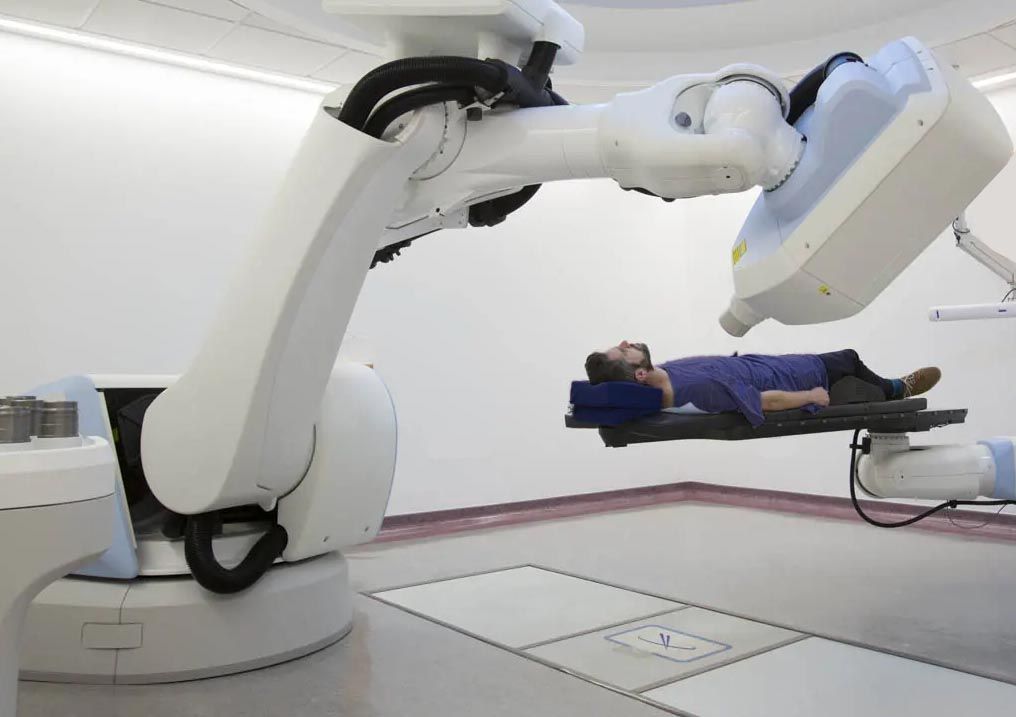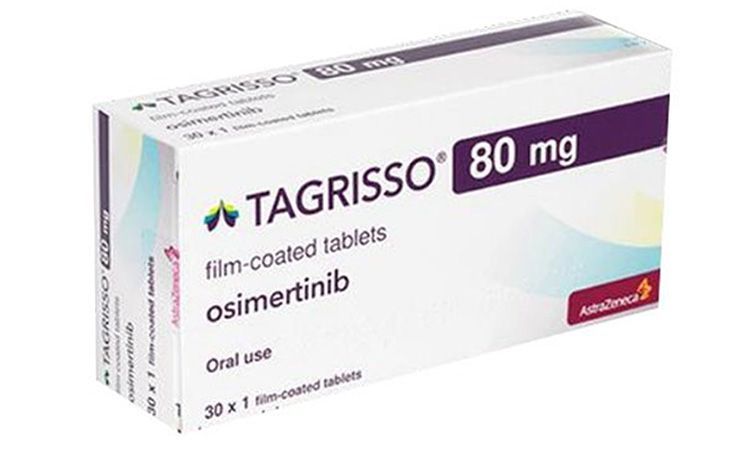EGFR Lung Cancer Treatment: A Patient's Story of Hope and Precision Care
When Harry developed a persistent cough in early 2024, he assumed it was his asthma. Months later, he received a diagnosis that changed everything: Stage 4 EGFR mutated non-small cell lung cancer that had spread to his spine.
What happened next offers valuable insight for anyone facing a similar diagnosis, whether you're a patient yourself or searching for the best care options for someone you love.


Jump to:
- Understanding EGFR Lung Cancer
- Harry's Diagnosis: When Time Matters
- Why Harry Chose Dr James Wilson
- Treatment for EGFR Lung Cancer: Harry's Personalised Plan
- 1. Stereotactic Radiotherapy to the Spine (CyberKnife)
- 2. Targeted Therapy: Osimertinib
- 3. Bone-Strengthening Treatment: Denosumab
- 4. Chemotherapy
- The Impact: From Overwhelming Symptoms to Quality of Life
- Understanding Your EGFR Mutation Type
- Life After Treatment: Finding a New Normal
- Advances in EGFR Lung Cancer Treatment
- What Harry's Story Teaches Us About EGFR Lung Cancer Treatment
- Speed Matters
- Precision Technology Makes a Difference
- Personalised Care Changes Everything
- Modern Treatments Offer Real Hope
- What to Do If You've Been Diagnosed with EGFR Lung Cancer
- Questions You Might Be Asking
- Treatment Options Beyond Standard Pathways
- Your Next Step
- Request a Consultation
- Frequently Asked Questions About EGFR Lung Cancer Treatment
- About Dr James Wilson
- Ready to Discuss Your Options?
Harry's Journey: From Diagnosis to Treatment with Stereotactic Radiotherapy (CyberKnife) and Targeted Therapy
If you are looking for information about lung cancer treatment - click here.
Understanding EGFR Lung Cancer
EGFR mutated lung adenocarcinoma is a specific type of non-small cell lung cancer where cancer cells contain a change in the EGFR gene. The EGFR (epidermal growth factor receptor) is a protein on the cell surface that, when mutated, drives cancer growth. This EGFR mutation is found in approximately 10-15% of lung cancer cases in the UK and is more common in non-smokers.
The link between ultra-processed food and lung cancer is becoming stronger - whether there is a linke with EGFRm lung cancer specifically remains to be seen.
The presence of an EGFR mutation matters because it opens the door to targeted treatments called EGFR inhibitors or EGFR TKIs (tyrosine kinase inhibitors) that work differently from traditional chemotherapy. These targeted therapies, combined with advanced radiotherapy techniques, can offer effective disease control even when cancer has spread.
EGFR positive lung cancer differs significantly from small cell lung cancer or EGFR-negative non-small cell lung cancer because EGFR mutant lung cancer responds specifically to drugs that block the abnormal epidermal growth factor receptor protein.
Harry's Diagnosis: When Time Matters
Harry's experience as a lung cancer patient reflects what many patients face. A persistent cough that seemed manageable turned into something more serious. After an X-ray in late April, he learned he had lung cancer. Further tests revealed it was EGFR mutated lung cancer that had spread through his body, including to his spine.
For Harry, the period between diagnosis and finding the right oncologist was marked by anxiety and frustration with communication. He needed clarity, speed, and someone he could trust to guide him through what felt overwhelming.
Why Harry Chose Dr James Wilson
Through his health insurance advisor, Harry found Dr James Wilson's details on a specialist directory. What stood out wasn't just credentials, it was the immediate connection from their first meeting.
As Harry recalls: "James actually came out of his room just to say hello and apologised for being a minute late. There was a connection that told me right from the beginning I'm in good hands and this is someone I can really accept as my oncologist for a very long time."
That sense of being seen, heard, and cared for as an individual rather than a case number became the foundation of Harry's treatment journey.
Treatment for EGFR Lung Cancer: Harry's Personalised Plan
Harry's treatment combined three approaches, each targeting different aspects of his EGFR lung cancer:
1. Stereotactic Radiotherapy to the Spine (CyberKnife)
Because Harry's cancer had spread to two vertebrae in his spine, the first priority was treating these metastases with stereotactic radiotherapy, delivered using CyberKnife technology.
Stereotactic radiotherapy (also called SABR or SBRT) is an advanced form of radiotherapy that delivers highly precise, high-dose radiation to tumours while minimising exposure to surrounding healthy tissue. For spine metastases, this precision is critical.
Harry received three CyberKnife treatments over a short period. His experience was notably uneventful: "It is almost a relaxation studio with music. The hardest bit was staying in a completely solid position, not moving any body parts for a certain period of time."
He experienced minimal side effects until after the final treatment, when he developed some occasional back pain as the cumulative effect took hold. Even this was manageable.
The rapid access to this treatment meant Harry could begin addressing his cancer immediately, rather than waiting in a queue while the disease progressed.

2. Targeted Therapy: Osimertinib
Simultaneously with his radiotherapy, Harry began taking osimertinib, a daily tablet specifically designed for EGFR mutated NSCLC (also called Tagrisso). Osimertinib is an EGFR tyrosine kinase inhibitor (EGFR TKI), a type of targeted therapy that works by blocking the abnormal EGFR protein on NSCLC cells that drives cancer cell growth.
Unlike chemotherapy, which affects all rapidly dividing cells in the body, EGFR TKIs specifically target cancer cells that have EGFR mutations. This precision approach is why many NSCLC patients with EGFR positive NSCLC experience fewer side effects compared to traditional chemotherapy.
Harry's treatment followed the approach used in the FLAURA-2 clinical trial, which demonstrated improved patient outcomes when osimertinib is combined with chemotherapy for patients with EGFR mutations. Clinical trials like FLAURA-2 have fundamentally changed how we approach metastatic NSCLC treatment in clinical oncology.
For Harry, the osimertinib has been well tolerated. "Something that could have side effects, but so far hasn't had any that I can pinpoint to the pill," he notes.

3. Bone-Strengthening Treatment: Denosumab
Because cancer had spread to Harry's bones, he also receives denosumab injections every three weeks. This medication helps strengthen bones and reduce the risk of fractures or complications from bone metastases.
4. Chemotherapy
Harry completed four cycles of chemotherapy as part of his initial treatment plan, working alongside the osimertinib to control his cancer.
The Impact: From Overwhelming Symptoms to Quality of Life
The most remarkable change for Harry came quickly. His persistent, debilitating cough, which had prevented him from working effectively or even sleeping properly, disappeared within a short period.
"The most remarkable thing is that within a very short period of time, my coughing disappeared and that was the lifting of a massive weight," Harry explains. "Suddenly I was able to engage in teams meetings at work again, to have longer conversations with friends and relatives. It improved my quality of life so much."
Harry's experience illustrates something important about modern EGFR lung cancer treatment: when the right treatments are matched to the right patient at the right time, the impact on daily life can be significant and rapid.
Understanding Your EGFR Mutation Type
Not all EGFR mutations are the same, and understanding your specific mutation helps guide patient selection for different treatments. The most common EGFR mutations include:
EGFR exon 19 deletion and exon 21 L858R mutation account for about 85-90% of EGFR mutations in lung cancer patients. These are considered "classical" or common mutations and typically respond very well to EGFR tyrosine kinase inhibitors like osimertinib.
Uncommon EGFR mutations include changes in EGFR exon 18, exon 20, or other less frequent alterations. Some uncommon mutations, such as EGFR L858R point mutations in combination with other changes, may require different treatment approaches as discussed in medical oncology and thoracic oncology specialties.
Modern testing often uses liquid biopsy alongside traditional tissue biopsy. Liquid biopsy analyses blood samples to detect cancer DNA, offering a less invasive way to identify EGFR mutations and monitor for disease progression during treatment. This approach has been validated in multiple clinical trials and is increasingly used in clinical practice.
Life After Treatment: Finding a New Normal
Harry's journey continues. He's on long-term maintenance treatment with osimertinib and regular bone-strengthening injections. His life has returned to something close to normal, including his passion for speed chess, where his rating has recovered to pre-diagnosis levels.
"My life now is almost back to normal," he shares. "And what I would say is that there's a silver lining, which is that you suddenly start appreciating the little things in life a little more."
Advances in EGFR Lung Cancer Treatment
The landscape of lung cancer treatment has changed dramatically in recent years, particularly for patients with EGFR mutant lung cancer. Research published in journals like Cancer Research has demonstrated that EGFR inhibitors can transform outcomes for lung cancer patients.
Understanding how tyrosine kinase inhibitors work helps explain why they're so effective. The epidermal growth factor receptor is a protein that normally helps control cell growth. When EGFR gene mutations occur, this protein becomes overactive, driving uncontrolled cancer cell division. EGFR TKIs block this abnormal signaling, stopping cancer growth at its source.
Clinical trials have been instrumental in improving patient outcomes. Studies comparing different EGFR tyrosine kinase inhibitors, evaluating combination approaches, and exploring optimal treatment sequences continue to refine how medical oncology specialists approach EGFR NSCLC. The FLAURA-2 trial that informed Harry's treatment is just one example of how clinical research directly improves care for NSCLC patients.
For lung cancer patients facing a new diagnosis, these advances mean more options, better tolerability, and improved quality of life compared to what was available even a decade ago. Medical Crossfire discussions and thoracic oncology conferences regularly highlight new developments in managing EGFR positive NSCLC, ensuring specialists stay current with evolving best practices.
What Harry's Story Teaches Us About EGFR Lung Cancer Treatment
Speed Matters
Harry's treatment began the week after his first consultation with Dr Wilson. When cancer has spread, waiting months for a treatment plan can mean watching the disease progress. Rapid access to specialist care removes that terrifying uncertainty.
Precision Technology Makes a Difference
Stereotactic radiotherapy to Harry's spine metastases meant targeted, effective treatment with minimal disruption to his life. Three sessions over a short period, rather than weeks of daily radiotherapy or major surgery.
Personalised Care Changes Everything
Harry didn't just receive treatment, he received a clear plan explained in terms he could understand, delivered by someone who treated him as a person, not a case file. That human connection provided emotional reassurance alongside clinical expertise and reflects the same approach I describe in my article on personalised medicine and tailored cancer care.
Modern Treatments Offer Real Hope
The combination of stereotactic radiotherapy, targeted therapy with osimertinib, and supportive care demonstrates how far lung cancer treatment has advanced. Even with Stage 4 EGFR lung cancer, quality of life and effective disease control are achievable goals.
What to Do If You've Been Diagnosed with EGFR Lung Cancer
If you or someone you care about has been diagnosed with EGFR mutated lung cancer, you may be feeling overwhelmed by information, anxious about delays, or uncertain about what the best treatment path looks like.
Harry's advice to someone in his position? "I'm now in a position to give them qualified comfort. Many people around me are completely overwhelmed when hearing that I have lung cancer, Stage 4, simply because of the image and label that's been associated with such a condition for a long time. There are not many people who are aware of what is possible these days and the progress that cancer treatment has made."
Questions You Might Be Asking
Is stereotactic radiotherapy right for my situation?
This depends on factors including where the cancer has spread, how many metastases are present, and your overall health. A specialist consultation can assess whether this precision treatment is suitable.
How quickly can treatment start?
In private care, the timeline from consultation to treatment can often be measured in days or a couple of weeks rather than months. This rapid access can be crucial when cancer is progressing.
Will targeted therapy like osimertinib work for me?
Osimertinib is specifically designed for EGFR mutated non-small cell lung cancer. Testing confirms whether your cancer has this mutation and which specific EGFR mutation you have, as this guides treatment choice.
What if I'm already under NHS care?
Seeking a private consultation doesn't mean abandoning your NHS team. Many patients seek a second opinion or faster access to specific treatments while maintaining their NHS pathway for other aspects of care.
How do I know if I'm making the right decision?
This is perhaps the most common concern. Having a clear, personalised treatment plan explained by a specialist who takes time to listen to your concerns and answer your questions can replace uncertainty with confidence.
Treatment Options Beyond Standard Pathways
Harry's story demonstrates that when EGFR lung cancer treatment is personalised and delivered with urgency, patients can experience:
-
Rapid symptom relief (Harry's cough resolved quickly)
-
Minimal treatment disruption (outpatient CyberKnife sessions)
-
Return to normal activities (Harry returned to work and his hobbies)
-
Clear, ongoing support (regular monitoring and treatment adjustments)
None of this required months of waiting or navigating bureaucracy. It required a clear plan, delivered by an expert team, starting promptly.
Your Next Step
If you're searching for clarity about EGFR lung cancer treatment options, whether for yourself or someone you love, you're welcome to request a consultation to discuss your individual situation.
A consultation provides:
-
Clear explanation of your diagnosis and what it means
-
Discussion of treatment options specific to your cancer
-
Transparent information about timelines, costs, and what to expect
-
The opportunity to ask questions without rushing
-
A personalised treatment plan if you decide to proceed
You don't need to become your own medical researcher. You don't need to carry the burden of decision-making alone. And you don't need to wait months in uncertainty.
Harry found that connection and clarity in his first meeting. "I would definitely recommend Dr Wilson to anyone in a situation that they would need James' help," he concludes.
Request a Consultation
If you'd like to discuss your EGFR lung cancer diagnosis and explore your treatment options, you can request a consultation at drjameswilson.co.uk/contact.
Dr James Wilson is a Consultant Clinical Oncologist practising at leading London private hospitals, with particular expertise in advanced radiotherapy techniques including stereotactic treatments and personalised care for lung cancer.
Alternatively you can book directly by following this link.
Book nowFrequently Asked Questions About EGFR Lung Cancer Treatment
What is EGFR mutated lung cancer?
EGFR mutated lung adenocarcinoma is a type of non-small cell lung cancer where cancer cells have a specific genetic change in the epidermal growth factor receptor gene. This mutation makes the cancer responsive to targeted therapies called tyrosine kinase inhibitors.
How is EGFR lung cancer different from other types?
EGFR positive lung cancer differs significantly from small cell lung cancer or other non-small cell lung cancer subtypes. The presence of an EGFR mutation means your cancer may respond particularly well to EGFR inhibitors that block the abnormal EGFR protein. These treatments often have fewer side effects than traditional chemotherapy and can be more effective than standard approaches for EGFR mutant NSCLC.
Can EGFR lung cancer be treated if it has spread?
Yes. Harry's case demonstrates that even Stage 4 EGFR mutated lung cancer that has spread to bones can be effectively managed with a combination of targeted therapy, stereotactic radiotherapy, and supportive care. Research published in Cancer Research journals has shown that EGFR TKIs can significantly improve patient outcomes in metastatic NSCLC.
What is CyberKnife treatment?
CyberKnife is a brand name for stereotactic radiotherapy technology that delivers highly precise radiation to tumours. Despite the name, it involves no cutting or surgery. Patients typically lie on a treatment couch while the machine delivers targeted radiation from multiple angles.
How long does EGFR lung cancer treatment take?
This varies significantly. Stereotactic radiotherapy might be completed in 1-5 sessions. Targeted therapy with osimertinib is typically ongoing for as long as it continues to control the cancer effectively. Your specialist will create a timeline specific to your situation.
Will I lose my hair with targeted therapy?
Hair loss is not typically associated with osimertinib or other EGFR targeted therapies. This is one of the advantages compared to traditional chemotherapy, though some patients may experience other side effects like skin changes or diarrhoea.
How do I know which EGFR mutation I have?
Testing identifies the specific type of EGFR mutation, whether it's an EGFR exon 19 deletion, exon 21 L858R mutation, or one of the uncommon EGFR mutations. This information guides treatment selection and helps predict how well different tyrosine kinase inhibitors might work. Some institutions, including those affiliated with organisations like the National Cancer Institute, use advanced testing panels that can detect even rare mutations.
Is this treatment available on the NHS?
Osimertinib and other EGFR tyrosine kinase inhibitors are available on the NHS for EGFR positive NSCLC. Stereotactic radiotherapy is also available through the NHS, though access and waiting times can vary. Private care often provides faster access and more flexible scheduling.
What is the difference between EGFR lung cancer and other cancers?
EGFR mutations occur primarily in lung adenocarcinoma, though epidermal growth factor receptor alterations can occasionally be found in other cancers. However, breast cancer, prostate cancer, and other cancer types typically involve different genetic changes and require different treatment approaches. The tyrosine kinase inhibitors used for EGFR NSCLC are specifically designed for this mutation and wouldn't typically be used for epithelioid sarcoma or other cancer types without this specific genetic alteration.
What happens if my cancer progresses on treatment?
Disease progression while on an EGFR inhibitor doesn't mean treatment options have run out. Liquid biopsy can help identify resistance mechanisms, and different EGFR TKIs or combination approaches may be considered. Your oncologist will monitor for signs of progression and adjust your treatment plan accordingly, following guidance from clinical trials and established protocols in thoracic oncology.
This article reflects one patient's personal experience and should not be considered medical advice. EGFR lung cancer treatment outcomes vary between individuals. Always consult a qualified oncologist to discuss your specific diagnosis and treatment options.
About Dr James Wilson
Dr James Wilson is a Consultant Clinical Oncologist specialising in advanced radiotherapy techniques and personalised cancer care. He practises at leading private hospitals in London and has particular expertise in treating lung cancer and using precision radiotherapy approaches including stereotactic treatments.
For more information or to request a consultation, visit drjameswilson.co.uk.
Ready to Discuss Your Options?
If you're facing an EGFR lung cancer diagnosis and want clarity on your treatment options, Dr James Wilson offers consultations both in Central London and by video across the UK.
Whether you need a second opinion, want to explore advanced treatments like stereotactic radiotherapy and targeted therapies, or simply want faster access to specialist care, you're welcome to request a consultation.
In-person or video appointments available
Treatment delivered across the UK
No referral needed
Request a consultation at https://drjameswilson.co.uk/contact/
Book in directly by clicking on the 'Book now' button
You don't need to carry this burden alone. Like Harry, you deserve expert guidance, clear answers, and treatment that starts when you need it.
Book now